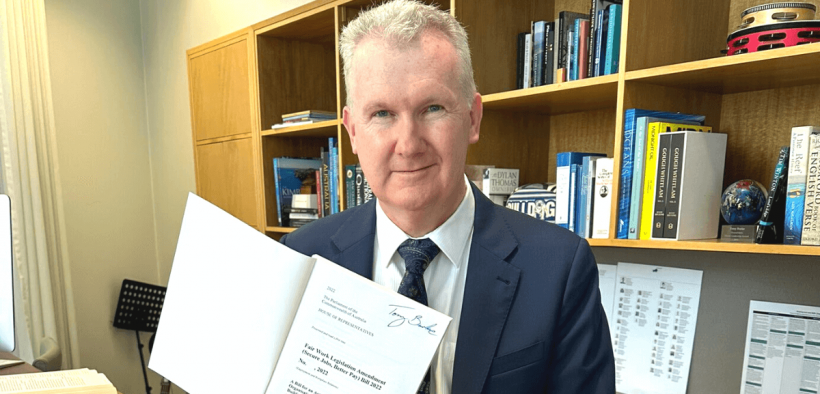New workplace laws to provide more flexibility for employees
Share

Employees will soon have more to request for flexible working hours with new workplace laws that will open the way to widespread multi-employer bargaining.
Workplace Relations Minister Tony Burke will be introducing the bill to parliament, kicking off the first tranche of workers’ rights reforms.
Under the bill, employers will be legally required to try to reach an agreement with employees who request flexible work hours. This includes making alternative arrangements if the request can’t be catered for.
The bill will also allow a worker to take the case to the workforce watchdog if their boss refuses their request.
Workers who are eligible under the bill are said to include parents with school-age children, carers, people with a disability and those above age 55 or experiencing domestic violence.
Minister Burke said people’s expectations of flexible work had changed in the past decade. However, he states that people who had their requests refused currently had no right of appeal.
“We need to be able to make sure that people have stronger powers to be able to get flexible work,” he said.
“There’s a good number of people out there where a change like this is life-changing for them.”
The workplace bill will also clear the way to multi-employer bargaining, a measure that is facing stiff resistance from business groups as it could lead to more strikes and risk jobs in the employment sector.
While existing laws already allowed for multi-employer deals, the federal government is simplifying the rules to make it easier for workers and businesses to strike agreements.
“There are some industries where bargaining hasn’t worked – where you get bargaining, you get better pay outcomes and better productivity outcomes,” Minister Burke said, adding that the measure would particularly help in female-dominated industries.
Check out: How EAs can become truly effective in the hybrid workplace
Speaking before the release of the detail of the bill, Australian Chamber of Commerce and Industry chief Andrew McKellar said workplace reform was the “one discordant note” in the federal government’s economic plans.
“The risk is if we don’t get this right, we will see an increase in industrial action and job losses will follow,” he said.
But Minister Burke denied the changes would lead to more strikes, saying the bill also introduced compulsory conciliation to help sort out disputes without industrial action.
Australian Council of Trade Unions national secretary Sally McManus said the most important issue for workers was getting wages moving at a time when inflation was far outstripping pay increases.
“Clearly there’s a problem at the moment – when the economy is good, workers don’t get pay rises and when the economy is bad, it’s the same thing,” she said.
“If we have people on a more equal footing, you get better outcomes. It’s a pretty straightforward solution.”
With AAP
Eliza is a content producer and editor at Public Spectrum. She is an experienced writer on topics related to the government and to the public, as well as stories that uplift and improve the community.






Today’s Pick
11th Annual Aus Goverment Data Summit
April 1, 2025
7th Annual NZ Government Data Summit
May 7, 2025
3rd Public Sector Comms Week
May 14, 2025
Subscribe
We send emails,
but we do not spam
Join our mailing list to be on the front lines of healthcare , get exclusive content, and promos.
AI appointment Australia Australian boost boosts business businesses covid-19 cyber cyber attack cyber security cybersecurity data data breach data management defence Digital employment enhance enhances fraud funding governance government grants infrastructure Innovation Lockdown management new zealand NSW NZ online privacy public Public Sector queensland renewable energy scams security Social Media Technology telecommunications victoria
-

Understanding and building your digital strategy
Digital Government, Opinion
-

Featured Leader: Jamie Morse on multi-channel strategies for communication
Communications, Featured Leader
-

Featured Leader: Tegan Tembe of NSW Treasury on creating solid planning strategies and processes
Featured Leader
-

Wirraka Maya Health Service improves patient care with My Health Record
Learning
Show More-

Effects of ineffective communication in the workplace
Communications, Personal Development
-

7 ways you can enhance your personal development skills
News, Personal Development
-

5 advantages of working in the public sector
News, Personal Development, Professional Development
-

7 causes of communication issues in the workplace
Communications, News, Personal Development
Show MoreLast Viewed